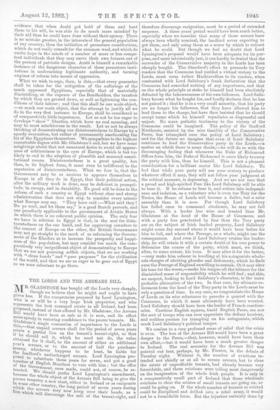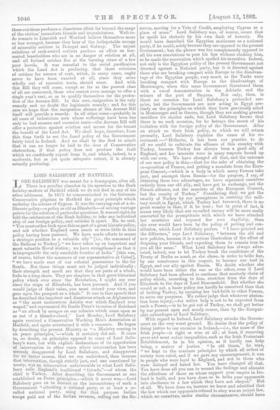THE LORDS AND THE ARREARS BILL.
mR. GLADSTONE has bought off the Lords very cheaply, though we believe that he might and ought to have given less. If the compromise proposed by Lord Lymington, who is or will be a very large Irish proprietor, and who represents the best managed estate in all Ireland, had been proposed, instead of that offered by Mr. Gladstone, the Arrears Bill would have been as safe as it is now, an& its effect more speedy in restoring confidence to the poorer tenants. Mr. Gladstone'ssingle concession of importance to the Lords is this,—that unpaid arrears shall for the period of seven years retain a partial lien on the tenant's tenant-right, so that if he should sell it, which he need not do, the value obtained for it shall, to the amount of either an additional year's arrears, or to the amount of half the purchase- money, whichever happens to be least, be liable for the landlord's undischarged arrears. Lord Lymington pro- posed to substitute three years for seven, and got a good number of English Members to vote with him ; but the offer of the Government, once made, could not, of course, be re- tracted. We should prefer Lord Lymington's amendment, because the whsle object of the Arrears Bill being to give the poorer tenantry a new start, either in Ireland or as emigrants in !erne other country, the long period of seven years during Lien the arrears may now hang over their heads, as a ien which will discourage the sale of the tenant-right, and
therefore discourage emigration, must be a period of extended suspense. A three years' period would have been much better,
especially when we consider that many of these arrears have always been wholly nominal, the landlord never expecting to get them, and only using them as a screw by which to extract what he could. But though' we feel no doubt that Lord Lymington's proposal would have been adequate for its pur- pose, and more intrinsically just, it can hardly be denied that the surrender of the Conservative majority in the Lords has been cheaply bought. The Standard's effort to persuade its Tory readers that the Commons had yielded a virtual victory to the Lords, must seem rather Machiavellian to its readers, when contrasted with Lord Salisbury's frank declaration that the Commons had conceded nothing of any importance, and that on the whole principle at stake he himself had been absolutely defeated by the lukewarmness of his own followers. Lord Salis- bury knows what he fought for, and loudly declares that he has not gained it ; that he is in a very small minority, that his party are no longer his followers, that they have allowed him to lead them to the charge, but have then insisted that he should accept terms which he himself repudiates as disgraceful and unjust. No more pathetic testimony to the victory of the Commons could be imagined. The policy of Sir Stafford Northcote, assisted by the wise timidity of the Conservative Peers, has triumphed over the policy of Lord Salisbury ; and for the future we imagine that even if Lord Salisbury continues to lead the Conservative party in the Lords,—a matter on which there is some doubt,—he will do so with the discouraging feeling that whenever the Duke of Richmond differs from him, the Duke of Richmond is more likely to carry the party with him, than he himself. This is not a pleasant consideration for a brilliant orator like Lord Salisbury. To feel that while your party will use your oratory to produce whatever effect it may, they will not follow your judgment at the critical moment, is depressing. And we are not sure that a proud and high-spirited Peer like Lord Salisbury will be able to bear it. If he refuses to bear it, and retires into independ- ence and isolation, as a volunteer who is even too Tory for the Tories, the House of Lords will become a duller, but a safer assembly than it is now. For though Lord Salisbury has failed once to command obedience, he may not fail always. With a leader less wise and trusted than Mr. Gladstone at the head of the House of Commons, and with a party less penetrated by fear than the Tory party are on the subject of Irish landed property, Lord Salisbury might some day succeed where it would have been better for him to fail, and where the Peerage, as a whole, might rue the consequences. And even if Lord Salisbury retains the leader- ship, he will retain it with a certain doubt of his own power to determine the course of the party, which must, we think, alter, to some extent, his tone. It may alter it for the better, —may make him soberer in levelling at his antagonists whole- sale charges of abetting plunder and dishonesty, which he finds even the Peerage of England unwilling to sustain. Or it may alter his tone for the worse,—make his tongue all the bitterer for the diminished sense of responsibility which he will feel ; and this, we suspect, looking to Lord Salisbury's character, is the more probable alternative of the two. In that case, his ultimate re- tirement from the head of the Tory party in the Lords must be only a question of time. In any case, we congratulate the House of Lords on its wise reluctance to provoke a quarrel with the Commons, in which it must ultimately have been worsted. Lord Salisbury should have been the leader of French reaction- aries. Cautious English squires, timid English Peers, are not the sort of troops who can ever appreciate the defiant hauteur, and reckless passion for trampling on his antagonists, which mark Lord Salisbury's political temper.
We confess to a very profound sense of relief that the crisis is over. The loss of the Arrears Bill would have been a great danger to the Peers,—that, however, would have been their own affair,—but it would have been a much greater danger to Ireland. The real necessity for the Arrears Bill was pointed out best, perhaps, by Mr. Forster, in the debate of Tuesday night. Without it, the number of evictions in- tended not chiefly or at all to secure arrears, but to clear the estate of unprofitable tenants, had already become very formidable, and these evictions were telling most dangerously on the imagination of the whole Irish people. It is only in a comparatively small part of Ireland that these wholesale evictions to clear the estates of small tenants are going on, or could be going on. If the whole number of tenants so evicted could be disciplined and drilled into a rebel army, it would not be a formidable force. But the injustice certainly done by these evictions produces a disastrous effect far beyond the range of the victims' immediate friends and acquaintances. Well-to- do tenants in Limerick and Wexford believe themselves more or loss wronged, because they hear of the indisputable wrongs of miserable cottiers in Donegal and Galway. The unjust evictions of rack-rented cottiers produce an effect on low- rented leaseholders who are in no danger of eviction at all, and all Ireland catches fire at the burning straw of a few poor hovels. It was essential to the social pacification which the Land Act is producing, that these evictions of cottiers for arrears of rent, which, in many cases, ought never to have been exacted at all since they arose wholly out of excessive rents, should cease. And with this Bill they will cease, except so far as the poorest class of all are concerned, those who cannot even manage to offer a single year's rent, so as to qualify themselves for the protec- tion of the Arrears Bill. In this case, emigration is the only remedy and no doubt the legitimate remedy ; and for this case we hope that the emigration clauses of the Arrears Bill itself will provide a remedy. In all other cases—probably in all cases of industrious men whose sufferings have been due only to bad seasons and excessive rents—the Arrears Bill will offer a protection against eviction and secure for the tenant the benefit of the Land Act. We shall hope, therefore, from this time forth to see the Land policy of the Government fairly tried in Ireland. And we shall be the first to admit that it can no longer be laid to the door of Conservative obstruction, if that policy does not produce the fruit which we confidently expect from it, and which, indeed, to a moderate, But as yet quite adequate extent, it is already actually producing.































 Previous page
Previous page